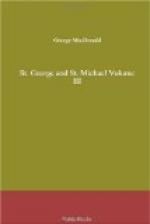‘Art thou then mine enemy, cousin?’
‘No, forsooth! I am the most loving friend thou hast.’
‘Then am I sorely to be pitied.’
‘For having my love?’
’Nay; for having none better than thine. But thank God, it is not so.’
‘Must I then be thine enemy indeed before thou wilt love me?’
’No, cousin: cease to be thine own enemy and I will call thee my friend.’
’Marry! wherein then am I mine own enemy? I lead a sober life enough—as thou seest, ever under the eye of my lord.’
‘But what wouldst thou an’ thou wert from under the eye of thy lord? I know thee better than thou thinkest, cousin. I have read thy title-page, if not thy whole book.’
‘Tell me then how runneth my title-page, cousin.’
’The art of being wilfully blind, or The way to see no farther than one would.’
‘Fair preacher,—’ began Rowland, but Dorothy interrupted him.
‘Nay then, an’ thou betake thee to thy jibes, I have done,’ she said.
’Be not angry with me; it is but my nature, which for thy sake I will control. If thou canst not love me, wilt thou not then pity me a little?’
’That I may pity thee, answer me what good thing is there in thee wherefore I should love thee.’
‘Wouldst thou have a man trumpet his own praises?’
’I fear not that of thee who hast but the trumpet—I will tell thee this much: I have never seen in thee that thou didst love save for the pastime thereof. I doubt if thou lovest thy master for more than thy place.’
‘Oh cousin!’
’Be honest with thyself, Rowland. If thou would have me for thy cousin, it must be on the ground of truth.’
Rowland possessed at least goodnature: few young men would have borne to be so severely handled. But then, while one’s good opinion of himself remains untroubled, confesses no touch, gives out no hollow sound, shrinks not self-hurt with the doubt of its own reality, hostile criticism will not go very deep, will not reach to the quick. The thing that hurts is that which sets trembling the ground of self-worship, lays bare the shrunk cracks and wormholes under the golden plates of the idol, shows the ants running about in it, and renders the foolish smile of the thing hateful. But he who will then turn away from his imagined self, and refer his life to the hidden ideal self, the angel that ever beholds the face of the Father, shall therein be made whole and sound, alive and free.
The dance called them, and their talk ceased. When it was over, Dorothy left the hall and sought her chamber. But in the fountain court her cousin overtook her, and had the temerity to resume the conversation. The moth would still at any risk circle the candle. It was a still night, and therefore not very cold, although icicles hung from the mouth of the horse, and here and there from the eaves. They stood by the marble basin, and the dim lights and scarce dimmer shadows from many an upper window passed athwart them as they stood. The chapel was faintly lighted, but the lantern-window on the top of the hall shone like a yellow diamond in the air.




